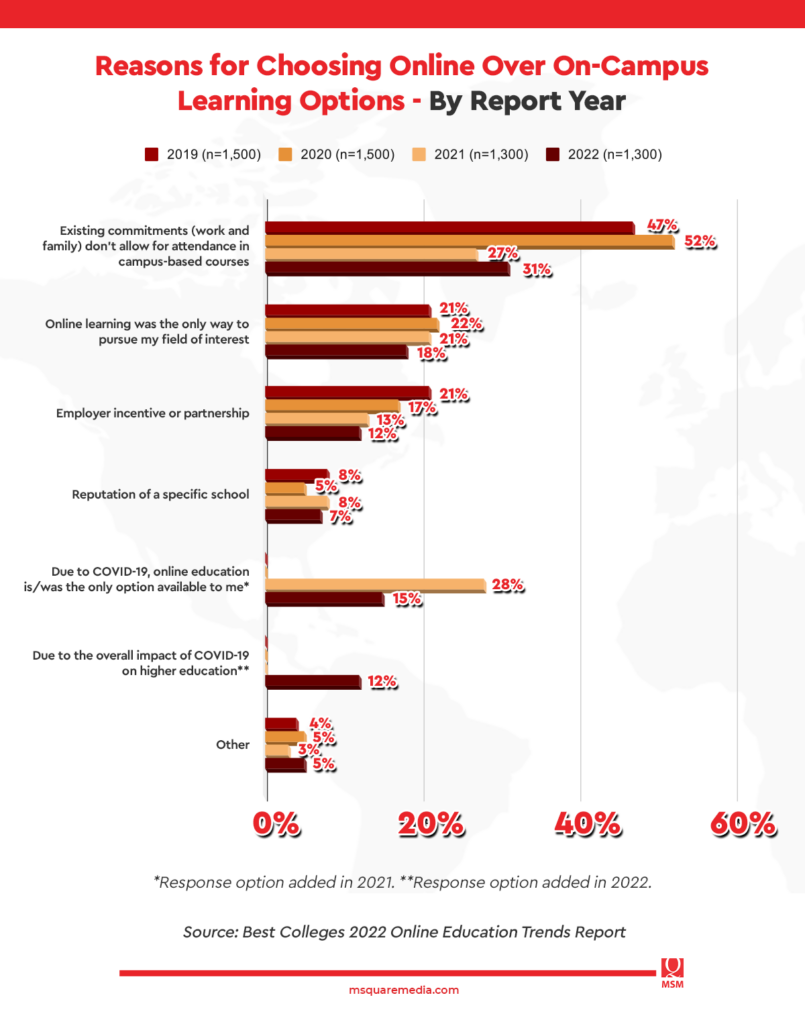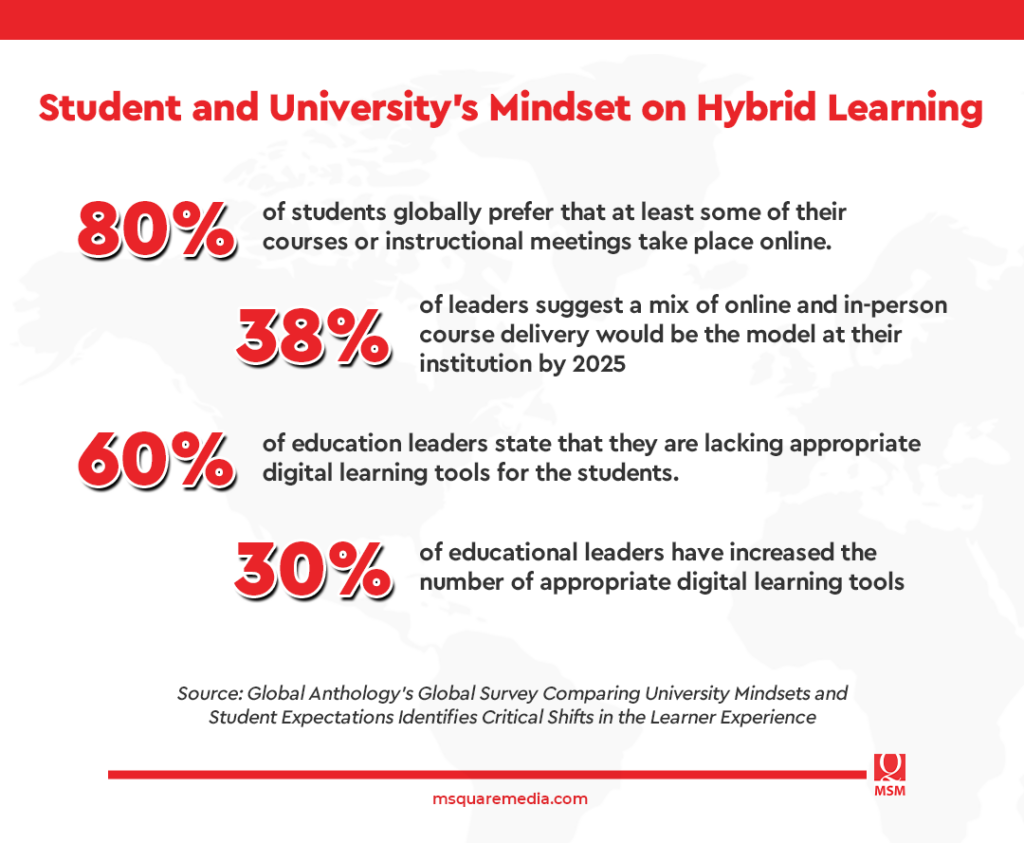Key Takeaways:
- A study shows that 80% of students globally prefer that at least some of their courses or instructional meetings take place online.
- 68.87% of current and prospective students said that they are concerned about “focus and self-motivation” when opting for online learning.
- 43% of the 351 school administrators reported that their institutions will continue to offer both remote and online format options for students in the future.
Nowadays, things are constantly changing faster than what is usual. Indeed, the pandemic birthed the era of “never normal” wherein we must be prepared for the uncertainty of the big changes of tomorrow.
In the international education sector, institutions, partners, and foreign students continue to thrive in this challenging phase by seizing the possibilities for growth. One of which is disrupting traditional models and adapting to an innovative discipline of education–through online learning.
While virtual education isn’t groundbreaking news at all, the abrupt shift from face-to-face to online studies pushed everyone out of their comfort zones to adapt.
Weighing the Pros and Cons of Hybrid Learning
Transitioning to hybrid learning has both beneficial and negative impacts on the education sector, especially the community of international students.
On the brighter side, having an option for online learning seemed gainful for international students who either have family and household obligations or have side hustles, as it allows them to study on their preferred schedule.
According to the 2022 Online Education Trends Report, convenience and flexibility are the top reasons for students taking online courses rather than being physically on campus.

Furthermore, e-learning allows students to study anywhere, even returning to their home country, which tends to have a lower cost. In addition to that, this mechanism also allows them to finish programs sooner than normal, as well as to enhance their critical thinking and digital literacy skills which are necessary to excel in the 21st-century society.
Despite the insightful effects on the students, one of the many challenges foreign students face is that it is harder to ask questions online. According to the 2021 UK International Student Survey, 57% of 105,083 international students across 191 countries would still prefer an offline inquiry to a lecturer, and only 14% of students said they found it easier to ask questions in an online lecture.
The time difference is another challenge to conquer. Studying in different time zones means either attending live lectures early in the morning or late at night. The report shows that 55% of international students said that they had to attend live online lectures at night due to time zone differences.
To add, restricted on-hand experience, limited participation, and limitation to technology and internet access, stability, and speed are the other factors to consider.
Students’ preference for hybrid learning
Certainly, adjusting to the phase of the never normal is quite an enigma to the international education scene. However, several studies found that there’s a higher favorable result when it comes to the impact on the students.
According to the Global Anthology study, Comparing Global University Mindsets and Student Expectations—which surveyed more than 5,000 higher education leaders and current students from countries around the world, including the United States, Australia, Brazil, Colombia, India, Japan, Spain, Saudi Arabia, South Africa, and the United Kingdom—data revealed that more than 80% of students globally prefer that at least some of their courses or instructional meetings take place online.

Complimenting the report, the QS survey revealed that 61% of international students have expressed an interest in studying online due to the pandemic.
And in a survey conducted by educations.com, participated by 7,400 current and prospective international university students, the study revealed that 85.1% of the current students are taking an online program at the moment due to the pandemic, while 45.2% of the prospective students are eager to enroll in an online degree as an alternative. The number may be nearing half, but this foresees promising sequels for future international enrollments despite the concern on “focus and self-motivation” with 68.87% ratings from both groups.
What’s more is that the recent QS UK International Student Survey (ISS) published that 52% of students surveyed believed that their university had been either “extremely” or “very” effective in delivering online teaching throughout the pandemic.
Time to embrace the never normal
Education leaders are now leaping and embracing the “never normal” era.
Early this year, the US government shared the good news of extending the March 2020 guidance that allows international students enrolled at a US school on March 9, 2020 to continue to take more online classes than permitted before the pandemic. In Canada, the government announced that international students can completely finish their studies from outside the country and remain eligible for a Post-Graduation Work Program.
Data on the global survey suggested that “leaders are moving their universities in the right direction, with more than a third (38%) indicating that a mix of online and in-person course delivery would be the model at their institution by 2025, increasing from 16% currently.”
BestColleges’ eighth annual Online Education Trends Report stated that 43% of the 351 school administrators reported that their institutions will continue to offer both remote and online format options for students in the future, up from 33% last year.
Conclusion
The “never normal” is here to stay. And what the institutions can do is prioritize the welfare of the students while envisioning the future for them. Institutions must assist and provide solutions to the students’ skepticism in hybrid learning through various ways such as offering time availability options for consultations, ensuring active participation with online tools, providing online resources as an alternative for physical textbooks, facilitating flexible teaching, setting up peer-to-peer support platforms, establishing a 24/7 helpline, and so much more.
After all, the key to adapting to the “never normal” is to reboot and unceasingly break the borders towards innovation and discovery. And for the international education sector, universities and partners must solidify their alliances to emerge stronger.

SUNEETHA QURESHI
MSM President - Global
Suneetha has worked for 15 years in the international education sector and 25 years overall for various industries, including her work for other industries. As president of MSM, she fortifies its business development outreach globally, particularly in the face of MSM’s foray into edtech-based recruitment via MSM Unify. She preserves the premium, value-adding services provided to each MSM partner institute, including dedicated teams on the ground, agent management, lead generation and inquiry management, application prescreening, and student and parent support through pioneering pre-departure briefing sessions.
She has an impeccable track record of successfully launching the representative offices in Asia and Africa of many North American and European higher education institutions. Her key strengths include hiring, training, and developing teams as evidenced by the successful results of the dedicated in-country college and university client teams.
Suneetha also has taken the lead in developing several initiatives at MSM, including building robust standard operating procedures, the Rise ‘n Shine team engagement platform, and the organization’s data analytics and audit segments.
Sources:
- Galgano, D. 2022. ICE extends period for international students to take hybrid, online courses. The GW Hatchet. Retrieved from https://www.gwhatchet.com/2022/04/21/federal-officials-extend-period-for-international-students-to-take-hybrid-online-courses/
- 2022. Global Survey Comparing University Mindsets and Student Expectations Identifies Critical Shifts in the Learner Experience. Global Anthology. Retrieved from https://www.prnewswire.com/news-releases/global-survey-comparing-university-mindsets-and-student-expectations-identifies-critical-shifts-in-the-learner-experience-301548984.html
- 2022. US gov’t lets foreigners study online more. Study International. Retrieved from https://www.studyinternational.com/news/study-in-america-march-guidance/
- 2022. Summer in Canada for International Students: Studying, Working, and More. Study in Canada. Retrieved from https://www.studyincanada.com/Discover/Article/1/5887/Summer-in-Canada-for-International-Students-Studying,-Working,-and-More
- 2022. Online Education Trends Report. BestCollege. Retrieved from https://www.bestcolleges.com/research/annual-trends-in-online-education/
- O, C. 2021. Majority of International Students Are Happy to Study Online. Top Universities. Retrieved from https://www.topuniversities.com/student-info/university-news/majority-international-students-are-happy-study-online
- Lane, C. 2021. How Has Online Learning Impacted International Students?. Top Universities. Retrieved from https://www.topuniversities.com/student-info/studying-abroad-articles/how-has-online-learning-impacted-international-students
- McKenzie, L. 2021. Students Want Online Learning Options Post-Pandemic. Inside Higher Ed. Retrieved from https://www.insidehighered.com/news/2021/04/27/survey-reveals-positive-outlook-online-instruction-post-pandemic
- 2021. The Top Benefits of an Online Education for International Students. Academy of Art University website. Retrieved from https://blog.academyart.edu/the-top-benefits-of-an-online-education-for-international-students/#:~:text=With%20online%20classes%2C%20you%27ll,behind%20while%20studying%20abroad%20online
- Segaren, S. 2020. 5 major benefits of online learning. Study International. Retrieved from https://www.studyinternational.com/news/benefits-online-learning/
- Witherow, K. 2020. Demand For Online Studies Skyrockets, But Here Are Students’ Biggest Concerns. educations.com. Retrieved from https://institutions.educations.com/insights/demand-for-online-studies-skyrockets-but-here-are-students-biggest-concerns
- 2020. Interest in online learning climbing quickly, but students still have concerns. The Pie News. Retrieved from https://blog.thepienews.com/2020/04/interest-in-online-learning-climbing-quickly-but-students-still-have-concerns/
- Supporting International Students in Online Classes. University of Colorado website. Retrieved from https://www.colorado.edu/office-undergraduate-education/faculty-staff/resources-working-international-students/supporting-international-students-online
